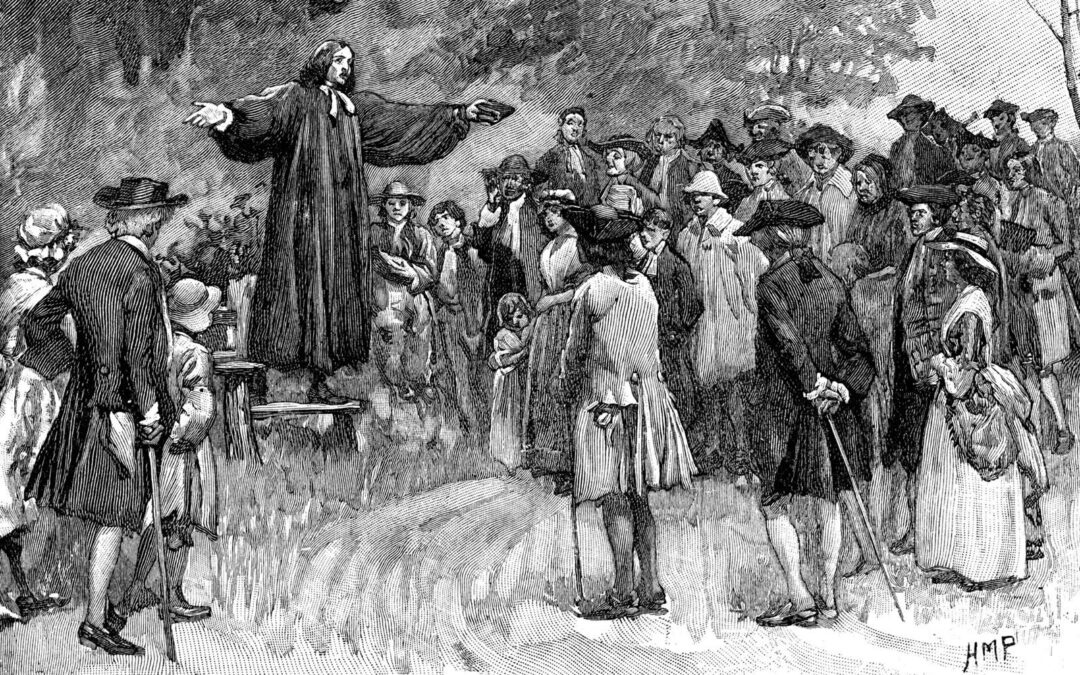Evangelist George Whitfield sketched during the Great Awakening in the 1700’s was instrumental to the religious underpinning and founding of the United States. America was founded upon the idea and practice of Christianity throughout her institutions. In fact, the US Supreme Court has recognized that Christianity is the official religious practice of the United States.
The recent Pew Research article “Modeling the Future of Religion in America” has given another stark warning. At this point, most are aware of Polls showing the steep decline in religion, particularly over the past decade (with the corresponding explosive growth of those identifying as “nones”). The Pew article gives us insight to the future if trends continue: “If the pace of switching before the age of 30 were to speed up throughout the projection period without any brakes, Christians would no longer be a majority by 2045. By 2055, the unaffiliated would make up the largest group (46%), ahead of Christians (43%). In 2070, 52% of Americans would be unaffiliated, while a little more than a third (35%) would be Christian.” It’s time for all Americans, religious or not, to consider the political ramifications and transform back. Let me explain.
Before the start of the American Revolution, an important transformation had occurred among the American people directly tied to religion. American colonial identity throughout much of the colonial period until the mid-1700s had been British in regards to belief in rights and Monarchy. There was no real distinctive “American” identity as yet. As John Adams would later write, however, “The Revolution was effected before the war commenced. The Revolution was in the minds and hearts of the people; a change in their religious sentiments of their duties and obligations.” John Adams to Hezekiah Niles, February 13, 1818. When Adams referenced the change in “religious sentiments”, he was referring to the effects of the American “Great Awakening” occurring from the 1730s up to the 1760s. This was a series of Christian revivals occurring throughout the American colonies of the time, and noted for mass gatherings of thousands listening to passionate Biblical Sermons. The Sermons emphasized a personal relationship with Christ and has been described thusly: “Championed by Jonathan Edwards in Northampton and typified by the preaching tours of George Whitefield, Theodore Jacob Frelinghugusen, James Davenport, Samuel Davies, and Gilbert Tennent, the revivals emphasized the focus on ‘spiritual rebirth.’… God acted through the heart and commitment of each individual… This meant that God did not work exclusively through kings or bishops, the clergy or the magistrates, but through the people themselves… when the Revolution was ignited… the Great Awakening assisted in formulating the ideology”.
Founding Father Benjamin Franklin was a witness to the Great Awakening, and friend of George Whitfield. Franklin famously noted: “It was wonderful to see the Change soon made in the Manners of our Inhabitants; from being thoughtless or indifferent about Religion, it seem’d as if all the World were growing Religious; so that one could not walk thro’ the Town in an Evening without Hearing Psalms sung in different Families of every Street.” From another description of the way the Great Awakening transformed America for Revolution: “For the first time, the individual colonies had a commonality with the other colonies. They were joined under the banner of Christ. Clearly, their unity gave them strength to face the impending danger of war with England. Not only did the Great Awakening unite the colonies religiously but also politically. After being freed from inner sin, the colonists also sought freedom from external tyrants. The motto of the Revolutionary War was, “No King but King Jesus!”
The Founding fathers were primarily intellectuals who followed the ideas of famed political philosopher John Locke. Locke wrote that men in nature are born “equal” with “unalienable rights to life, liberty and property” and that governments derive just authority from the consent of the governed. Locke’s ideas of individual rights and equality fit within the newly transformed religious American people, with their newfound understanding of the personal connection to God. The founders understood this, and couched the language of the Declaration of “unalienable rights” being “endowered by their Creator”. The took the religious and put it in words those of the enlightenment would understand.
With the new hyper-secularism, we are seeing a seeming reverse of what happened with the Great Awakening. Rising attacks on property rights, with the corresponding steep rise in favorability towards socialism. The increasing acceptance of the idea “elite” experts should make decisions for us, even when violating “unalienable” rights. Calls for transforming our Constitutional institutions (“Reinvent our institutions internally” is now in the preamble to the Democratic Party). Calls to scrap the Second Amendment and weaken the First. Demeaning of the concept of freedom. We are also witnessing the normalization of an anti-Christianity previous Americans could not have imagined. The promotion of genital mutilation of children through “gender affirming surgery”. Promotion of sexually deviancy and attacks on the family to children. The explosion of crime and coddling of criminals. The direct attacks on religion are growing by the day. Then all the corresponding economic consequences.
As Adams’s reminds us, political revolution occurs first in the mind influenced by the religion of a people. For those who care about the future of America, it’s time to heed Proverbs 14:34 “Righteousness exalts a nation, but sin is a reproach to any people”. It’s time to transform back if we want to remain free.
Please share freely and donate to The Standard on this page to assure the continued availability of news that is ignored too often by the dominant media.
Please “like”, comment, share with a friend, and donate to support The Standard on this page.





 RSS - Posts
RSS - Posts